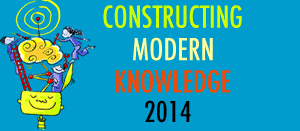Stage: A whole new world
You hear an inspiring keynote at a conference, read a book, or see a colleague use technology in their classroom. It clicks with something inside you.
Stage: Connection
You try to understand the role of technology in your life as an educator. Coincidently, you start to see this topic pop up all around you. It seems to be haunting you. You set up a blog reader and add a few feeds. You find a guru whose words help you make sense of the murky picture.
You read books, start your own blog, or change something in your everyday life. You go to an educational technology conference and attend every session.
Stage: Stepping into the void
You implement a project you never would have attempted before. You get more and more into the subject and are amazed that there is such a vast network out there. You add more blog feeds, listen to podcasts, buy books, start a wiki, subscribe to magazines, and join other networks and conversations. You wonder why grad school never felt like this.
You feel renewed as an educator and lifelong learner. Your colleagues wonder what’s gotten into you.
Stage: Firehose
You try too many new tools and join too many networks. You start to resent it when someone introduces something new. You hate your pile of unread stuff. Your blog feeds start to overwhelm you. No one comments on your best blog posts. It seems there is just too much to keep track of, and it never stops.
You get a bit depressed that you are so late coming to the party.
Stage: The big picture overwhelms
You wonder if what you are doing is just a waste of time. You find analogies to the failure of school in everyday occurrences. Your regular friends look at you funny when you start using words like “pedagogy” and railing about the “factory model of education” in everyday conversation.
You find that it’s not just technology-using educators who feel this way, that education reformers have been saying things like this for decades, even centuries.
You are sure that “school” cannot be fixed.
Stage: Ennui
You commiserate with your network about people who don’t “get it.” People who are coming late to the party annoy you. You tire of the clichés that seemed so fresh at first. You say things like, “If I hear about sage on the stage / guide on the side (or digital natives/immigrants, or anything 2.0, or insert your own pet peeve here) one more time, I’ll kill someone!” You meet your gurus and find out they are just human, and maybe really wrong about some things.
You stop going to conference sessions. Someone accuses you of being in the “in” group.
Stage: Renewal
You accept that you won’t ever be able to keep up with the hype machine and stop worrying about it. Your project goes well and your plans expand.
You start to narrow down your areas of interest and explore them deeper.
Stage: Building expertise
You attempt something on a wide scale, collaborating with other like-minded educators. You find renewed energy as you work with students or teachers and see things change. You find books, even some written decades or centuries ago that support your beliefs. You become better able to articulate the “why” of all this. You think about going back to school. You find experts outside of your newly constructed network.
People look to you for advice and expertise.
Stage: The circle of life
You connect with new people in their own early stages and give them guidance as they figure out what you have figured out. You mentor someone. A student says you’ve changed their life. You learn something new and feel that spark. You rededicate yourself to changing what you can. You think that if these ideas can take hold, even if it has to happen one person at a time, there is hope for the concept of school after all.
You use the phrase, “sage on the stage vs. guide on the side” – see someone’s eyes light up and forgive yourself.
Sylvia
Originally published 8/19/2008

